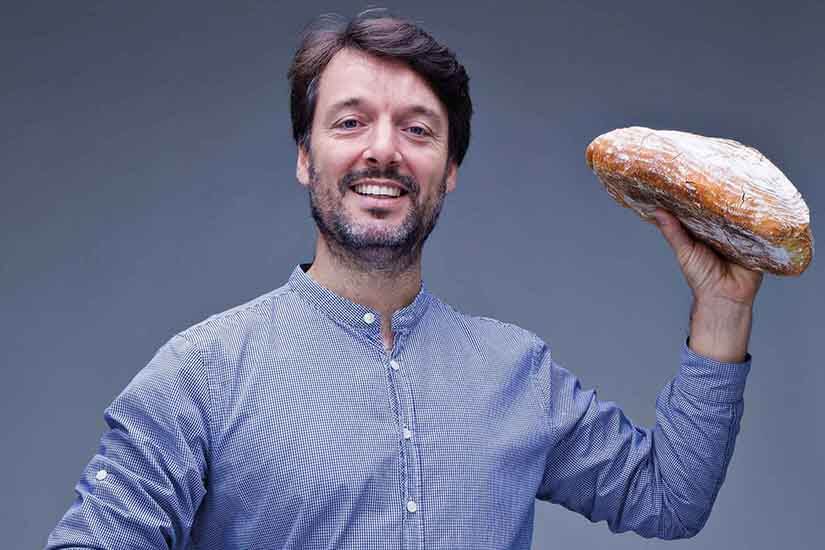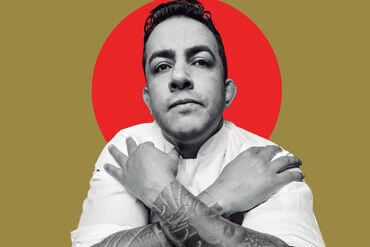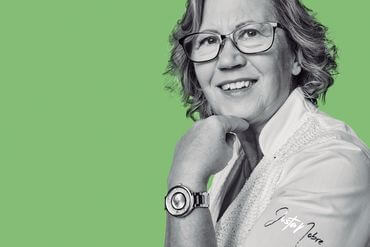
Iban Yarza
Since early 2017 we have had the good fortune to have a distinguished new resident on the island. Ibán Yarza, regarded as a bread-baking ‘guru’ in Spain, is the author of the bestseller Pan Casero (Home-made Bread) (Larousse, 2013). At the time of our interview, he is immersed in the preparation of a new book, Pan de Pueblo (Bread of the Villages and the People) (Grijalbo), a book which “endeavours to be the most comprehensive ever produced about bread in Spain.”
“I have covered 25,000 kilometres, and travelled through the 50 provinces of Spain, from Finisterre to Tarifa.” With deadlines approaching, we succeed in persuading him to give a couple of hours of his time, but from the autumn onwards, we will be able to enjoy his well-known courses as he assures us that he will be including Ibiza on his usual itinerary.
We talked with Ibán Yarza
How did you start making bread?
I started out of interest; what interested me more than making bread was seeing with a child-like impatience how the dough was made, and seeing how it rose.
And since then you have come to be considered the country’s greatest expert on bread, a veritable guru.
It’s worth pointing out that in the land of the blind, the one-eyed man is king. There are great bakers in Spain, but you often find yourself talking to people who have never read a book, which is neither a bad thing nor a good thing. So what happens is that you read three books, and then people say to you, “How do you know that?” Hell, because I’ve read three books, that’s all. Now there is a young generation of bakers which is coming along very nicely.
How would you encourage people to bake bread at home?
Bread has something that cooking does not: in cooking you transform the ingredients, but bread goes one step further, the rising stage, which is a living metamorphosis. You can put bread dough in front of anybody, and they will be fascinated to see how it grows.

Now we are experiencing the bread boom similar to the cooking boom which at the same time, as you have commented on several occasions, can involve a degree of deceit.
Yes, when even Bimbo is advertising its bread using dough. What they normally use is dry leavening, a powder, which is just like a restuarant using Starlux when they are advertising food like grandma used to make. They sell a bag with all the ingedients in it: flour, dry leavening, additives so that the bread turns out springy, golden… All you have to do is add flour and water and there you go. It’s the death of baking. And then they sell you that as a gourmet product. The use of mis-named ‘improvers’ to make the bread more springy is widespread. We have reached a point where if you don’t use ‘improvers’, people think there is something wrong with the bread because it seems very heavy.
Without any previous training, how would you recognise good bread?
Simply by looking at it and tasting it. If your bread is stale by the evening, it’s because it is bad bread; if your bread doesn’t taste like bread, it’s bad bread; if your bread doesn’t smell of bread, it’s bad bread.
The use of mis-named ‘improvers’ to make the bread more springy is widespread
And what about youngsters, if the only bread they’ve tasted is the 40 Euro-cents baguette from the supermarket next door?
That is the problem, and it has already happened with other products. Milk, for example. In Spain we have lost milk; over 90% of the population of Spain don’t like milk because they buy UHT milk that has been through a process that has destroyed all the characteristics of milk. What you get in a carton of UHT does not taste of milk, it does not smell like milk, it doesn’t have the texture of milk…. And unfortunately, that is what 90% of the population have. For several generations they’ve grown up with UHT milk, and when you give them real milk they don’t like it. And the same thing is beginning to happen with bread.
So, in some respects bread is booming, and in other respects we are losing it?
Absolutely, through snobbery. Cooking is very much in fashion, and we say that we are a force to be reckoned with, and I often laugh, because in Spain we have seen the demise of milk, and we are beginning to see the demise of tomatoes… A little while ago, a chef told me he had arranged a tomato tasting session. People aged under 25 liked the perfect supermarket tomatoes, and they found that a big, juicy tomato fresh from the garden tasted strange. In this situation, there needs to be training: from an early age, children should be given food that tastes as it is supposed to taste.

Kneading bread © ffmag
In the restaurant trade, is bread being given the importance that you believe it deserves?
More and more. We have seen a few years pass where in some very famous kitchens, they did without bread so that it would not steal the show, or so that it would not fill you up, but now I believe that increasingly the spotlight is falling on bread. Last year, Aduritz had bread and cheese as an item on his menu. There are chefs who bake their own bread. Sometimes, too, it all gets a bit silly. You go to a restaurant, and they serve you bread with a million different flavours, and the quality is not that good. It is as if you went to a restaurant and they gave you wine with beer, or with tarragon, wine mixed with a fizzy drink of whatever flavour…
I honestly believe that the average is better than the average bakery on mainland Spain
And on Ibiza, how would you describe the quality of the bakeries?
I honestly believe that the average is better than the average bakery on mainland Spain, because normally the bakeries on Ibiza make the traditional island bread, which is a very simple bread, innocent in the sense that it is made with flour and water. It doesn’t contain salt, it doesn’t contain ‘improvers’. The people on Ibiza are not afraid of a thick, dense crumb, nor are they afraid of a dark crumb, so the bakers do not feel obliged to use a large amount of ‘improver’ like they do on the mainland, where people panic if the bread is not as white as snow or if it is not ‘super springy’. There are also cultural considerations: bread has played such an important part in life on Ibiza that there is an abundance of shapes, textures… The crusty breads are awesome: the crostas, the galleta forta which is thin slices of hard biscuit…. And then there are the wonderful sweet doughs, such as the Christmas biscuit… I love the baking tradition of the island because it is so innocent and pure. It is delicious, and we must not forget the cocas (typical pastries).
And what do you think of the standard of cooking on the island?
I believe Ibiza has a little-known cooking tradition which is fascinating because it has retained the spectacular medieval influence which you find in very few parts of Spain. Sofrit pagés (a typical dish of mixed meats and vegetables), for example, is actually a medieval dish.







